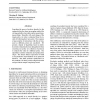Free Online Productivity Tools
i2Speak
i2Symbol
i2OCR
iTex2Img
iWeb2Print
iWeb2Shot
i2Type
iPdf2Split
iPdf2Merge
i2Bopomofo
i2Arabic
i2Style
i2Image
i2PDF
iLatex2Rtf
Sci2ools
101
click to vote
ICML
2002
IEEE
2002
IEEE
Learning from Scarce Experience
Searching the space of policies directly for the optimal policy has been one popular method for solving partially observable reinforcement learning problems. Typically, with each change of the target policy, its value is estimated from the results of following that very policy. This requires a large number of interactions with the environment as different polices are considered. We present a family of algorithms based on likelihood ratio estimation that use data gathered when executing one policy (or collection of policies) to estimate the value of a different policy. The algorithms combine estimation and optimization stages. The former utilizes experience to build a non-parametric representation of an optimized function. The latter performs optimization on this estimate. We show positive empirical results and provide the sample complexity bound.
Algorithms Combine Estimation | ICML 2002 | Likelihood Ratio Estimation | Machine Learning | Optimal Policy |
Related Content
| Added | 17 Nov 2009 |
| Updated | 17 Nov 2009 |
| Type | Conference |
| Year | 2002 |
| Where | ICML |
| Authors | Leonid Peshkin, Christian R. Shelton |
Comments (0)

